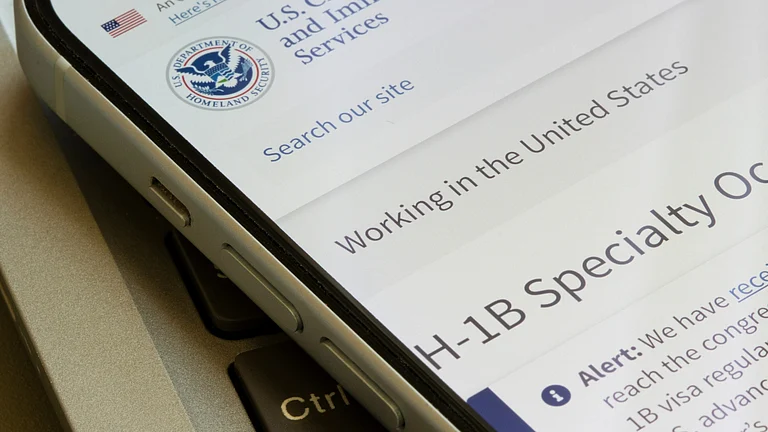
US firms are reducing H1-B visa sponsorships following Trump administration policy changes, with postings offering sponsorships dropping from1.9% in 2025.
Indian nationals are facing increased job insecurity amid a slowing US labour market and stricter visa rules.
New measures such as visa fee hikes, the end of EAD extensions, and the proposed HIRE Bill could further discourage foreign talent.
Following a series of policy changes by US President Donald Trump, including a visa fee hike, a growing proportion of international students in the US are now struggling to find jobs as employers reduce visa sponsorships, reports said.
The H1-B visa programme has been a holy grail for skilled foreign graduates, allowing them to stay and work in the US. However, recent developments have prompted firms to limit sponsoring international students. According to a Bloomberg report, career platforms for students show full-time job postings offering visa sponsorship dropped to 1.9% in 2025, compared to 10.9% in 2023. The technology sector was the worst hit, declining to a third of last year’s level.
“President Trump promised to put America First, and this common-sense action does just that by discouraging companies from spamming the system and allowing foreign workers to undercut American wages,” Bloomberg quoted White House spokesperson Taylor Rogers as saying. However, the US administration has clarified that recent graduates and workers who are on student visas will be exempt from the new fee
How Much Are Indians Impacted
As per data from the US Citizenship and Immigration Services, Indian nationals accounted for more than 70% of H1-B visa recipients in 2024, The Economic Times reported. Industry experts at leading universities suggest that international students now apply to more positions than before, often with lower chances of success. Meanwhile, companies are being cautious amid a slowdown in white-collar hiring and the US labour market showing mixed signs of growth. Unemployment among the population aged 22–27 reached 5.8% in April, the highest level since April 2021. Reports say the weakening labour market, coupled with stricter visa rules, may discourage international students from viewing the US as a destination for long-term career prospects.
Series of Challenges for Foreign Workers
Apart from the visa fee hike, the US Department of Homeland Security has ended the automatic extension of Employment Authorization Documents (EADs) for certain non-citizens, including H-1B spouses. Moreover, the US Congress is currently debating the HIRE Bill, which may have a bigger impact on foreign workers and companies, as firms will be taxed for outsourcing under the HIRE Act. Experts are also suggesting ways to cope if the bill is passed, such as expanding Global Capability Centers (GCCs), which are the in-house facilities of multinational companies abroad.
The policy adjustments in the US underscore the mounting barriers facing skilled foreign workers and students seeking to build careers in the country.





























